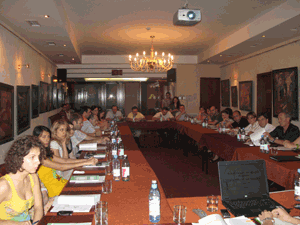 Nona Suvariani, Tbilisi
Nona Suvariani, Tbilisi
On August 5 Young Lawyers Association held one more meeting within the Week on the Publicity of Information. The presentation of the third edition of “Analyze Court Practice Regarding Information” was organized at the venue of the hotel “Ambassador.”
The edition discusses the actualization of publicity of information and the promotion of established practice. The research provided by the GYLA covers cases deal with access to public information that was discussed from May 2005 to February 2008. All of these cases contain legal conclusions.
GYLA started to analyze the court practice and court proceedings on the topic dating back to 2003. Tamar Kordzaia, the author of the research and member of the GYLA, stated that their activity aims to expose advantages and disadvantages of the introduction of court practice when it comes to the publicity of information.
“The presented edition is the third one. Although court practice shows that explanations of the publicity of information are being developed, the problems on requesting private data still remain; information is not provided regarding the explanation of public-legal authorities; in general, regarding groundlessness of the court decisions. There are some faults on General Administrative Code that fails to create unilateral position regarding personal data. However, there are some positive features too. Take for example, the number of cases that were discussed at courts,”
Tamar Kordzaia draws her attention to another moment. General Administrative Code admits the responsibility of publicity. However, since the law was put into force many changes have been introduced into the law and many of them have blocked information. Consequently, publicity of the information is not envisaged in many newly adopted laws. Thus, in accordance to various legislative acts, many kinds public information have been blocked for greater society.
The representative of the GYLA spoke about one more problem which deals with the lack of basis for many court decisions.
“Court does not envisage determining damage which means the court should explain why the information has been blocked. What kinds of values are preserved when information is delayed, and if the information is considered as valuable under publicity of information?”
Public agencies are not very keen on issuing public information and every journalist is familiar with this constant problem. Tamar Kordzaia speaks about her own experience and pointed out that institutions refuse to issue public information on state secrets and not based on reason.
However, the fact that the number of discussed cases has increased means that the topic is most urgent as Society is interested in knowing more.
Tamar Kordzaia: “The activity of the society is exposed in the statistics. The number of court discussions in the field has increased. The court has passed 195 judgements since the General Administrative Code was first put into force; in 2005-2008 they passed 145 verdicts, which demonstrates that it has been a great success.”



